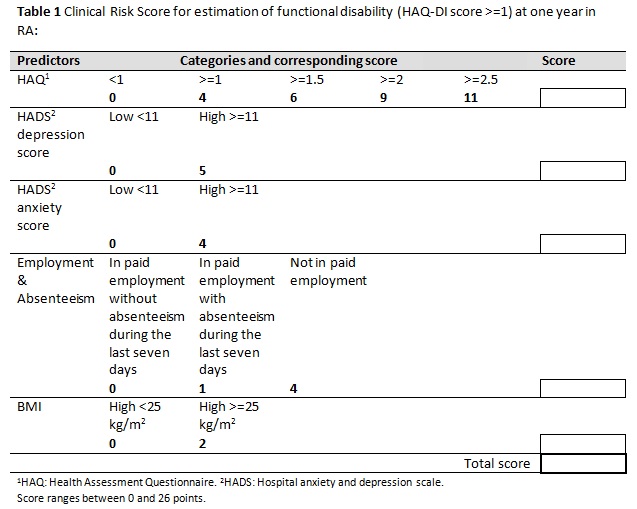Session Information
Date: Wednesday, November 11, 2015
Title: Rheumatoid Arthritis - Clinical Aspects VII: Disease Activity and Updates in Measurement
Session Type: ACR Concurrent Abstract Session
Session Time: 11:00AM-12:30PM
Background/Purpose: When diagnosed with rheumatoid arthritis (RA),
patients are especially concerned by the prospect of disability. Predictors of
future disability may inform early decision making. Previous studies have
sought to identify such predictors, but have been limited to the evaluation of
traditional biomedical measures within historical cohorts. This study aimed to
evaluate both psychosocial and biomedical factors, within a contemporary RA cohort,
in order to identify baseline predictors of significant disability at 1 year. Subsequently,
we aimed to develop a clinically useful tool which may support early patient
education and decision making.
Methods: Analysis used data from the Scottish Early Rheumatoid
Arthritis (SERA) inception cohort, an ongoing prospective multicentre study
which began recruitment in September 2011. A forward stepwise multivariable
logistic regression model was developed. Exposures were putative psychosocial
(e.g. work ability, depression, and anxiety) and biomedical (e.g. DAS28-CRP
score, neutrophil count and morning stiffness) baseline predictor variables.
The outcome was high functional disability (defined as a Health Assessment
Questionnaire [HAQ] score >1) at 1 year. The ability of the model to
correctly discriminate between patients at low and high risk of the outcome was
assessed using the c-statistic. Finally, a clinical prediction score was
created based on the coefficients of the predictors determined by the logistic
regression model. Each score was translated into a probability of reporting a
high HAQ score at 1 year. As a method of external validation, the score was
tested using SERA patient data which had been newly acquired since the initial
analysis.
Results: Of 578 participants (64.5% female), 80.6% (466/578)
fulfilled the 2010 ACR/EULAR classification criteria and 36.7% (212) exhibited
high functional disability at 1 year with a HAQ >1. Independent predictors
were baseline high HAQ score (OR 2.67; 95%CI 1.98 – 3.59), depression (2.52;
1.18 – 5.37), anxiety (2.37; 1.33 – 4.21), being in paid employment with
absenteeism during the last seven days (1.19; 0.63 – 2.23), not in paid
employment (2.36; 1.38 – 4.03) and obesity (1.61; 1.04 – 2.50). The good
discriminative performance of the model was evidenced by a c-statistic of 0.78.
The clinical prediction score (Table 1) ranged from 0 – 26 and had a
good discriminative performance in both the original (c-statistic 0.78) and
validation data sets (c-statistic 0.78).
Conclusion: In the context of modern treatment paradigms,
predictors of 1 year disability appear to be dominated by psychosocial rather
than more traditional biomedical measures. Such information may aid both
patients and physicians during initial management planning and alludes to the
potential benefit of early non-pharmacological interventions targeting key
psychosocial factors such as mental health and work disability.
To cite this abstract in AMA style:
Kronisch C, Mclernon D, Dale J, Paterson C, Ralston SH, Reid DM, Tierney A, Harvie J, McKay N, Wilson HE, Munro R, Saunders S, Richmond R, Baxter D, McMahon M, Kumar V, McLaren J, Siebert S, McInnes IB, Porter D, Macfarlane GJ, Basu N. A Clinical Risk Score to Predict Functional Disability at 1 Year in an Early Rheumatoid Arthritis Inception Cohort [abstract]. Arthritis Rheumatol. 2015; 67 (suppl 10). https://acrabstracts.org/abstract/a-clinical-risk-score-to-predict-functional-disability-at-1-year-in-an-early-rheumatoid-arthritis-inception-cohort/. Accessed .« Back to 2015 ACR/ARHP Annual Meeting
ACR Meeting Abstracts - https://acrabstracts.org/abstract/a-clinical-risk-score-to-predict-functional-disability-at-1-year-in-an-early-rheumatoid-arthritis-inception-cohort/

